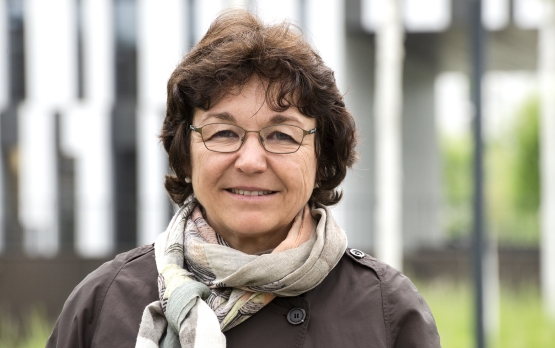“Idleness doesn’t sit well with me. In fact, I feel we should invest our energies in making progress, not in maintaining the status quo” says Eva Reinhard, Head of Agroscope since 1 April 2018. “Whenever my work helps to generate added value and accomplish something that was previously lacking, I feel a sense of achievement“ she adds. An example of this: her role in the drafting of international standards for feed safety and quality within the framework of the Codex alimentarius of the Food and Agriculture Organization (FAO) and the World Health Organization (WHO) – standards which were adopted internationally by the Codex Plenary Session in Rome in 2013. According to Reinhard, Switzerland has succeeded in positioning itself extremely well with regard to these standards.
Born in 1961, Eva Reinhard grew up in Zurich. After high school, she studied Biology at the ETH Zurich, then completed a PhD in Developmental Neurobiology at the Friedrich Miescher Institute for Biomedical Research (FMI) in Basel. Dr Reinhard acquired wide research experience at the European Chemicals Bureau in Ispra, Italy; Duke University, the University of Oregon and Stanford University in the USA; and Sandoz in Austria. In addition, she boasts ample leadership experience: for over twenty years – eighteen of them in the Swiss Federal Administration – she has worked in management positions, latterly as Deputy Director of the Federal Office for Agriculture. Being once again involved that much more closely with the development and implementation of new knowledge – a process which she finds fascinating – is what most appeals to her about her role as Head of Agroscope. “Without having to do the pipetting in the lab myself, I’m given research results which we can assemble like pieces of a puzzle. In this way, we arrive at a better understanding of the agroecosystem, which we can translate into solutions for practitioners.”
Her first contact with Agroscope, regarding the enforcement of chemical legislation, was during her stint at the Federal Office of Public Health “The thing that fascinated me about Agroscope back then was that so many people could work on a socially relevant topic without the constant one-sided pressure to succeed in the competitive national and international world of research.” Since 2014 when she joined Agroscope Council, she has viewed the research organisation from a different perspective – namely, from that of the strategy control room.
Where does Agroscope stand today, and where will it be in five years’ time? “Today, there are major doubts about Agroscope, both internally and externally. These doubts cost us a great deal of valuable time, which Agroscope is then unable to invest in dealing with its core tasks” says Dr Reinhard, summarising the current state of affairs. “My goal is that, in five years‘ time, Agroscope will no longer have to deal with issues of self-justification, and that its unique selling points will be recognised and experienced by all.” Regarding the ongoing structural reform, she says: “There are reforms because gaps exist. Those who first recognise these gaps have an opportunity to bridge them, thereby playing an active role in shaping the future.” What Agroscope needs now, she feels, is a constructive and positive debate with itself, and an innovative approach to the future project.
Despite her jam-packed work diary, Eva Reinhard makes time for leisure activities. She is particularly keen on the theatre, and goes often. She also enjoys a good meal. Since she began working in the agricultural sector, her relationship to food has changed. “Product origin and quality have become more important; today, I shop in far more aware a fashion than in the past.” And does she cook? “No”, she says, laughing: she leaves that to her partner, with whom she lives in Bern, and who is much more accomplished in the kitchen.






